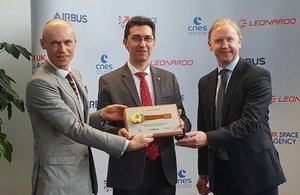A collaboration between two aerospace specialists and the UK and French space agencies has resulted in the development of a sophisticated forecasting instrument that will set new standards of accuracy in short-term weather prediction. Using high-performance infrared detectors made in Southampton in the UK, the new device will improve short-range weather forecasts by monitoring atmospheric instability and cloud structure. It will also analyze the content of the Earths atmosphere, detecting and tracking pollutants around the globe. Dr Graham Turnock, CEO of the UK Space Agency, said, The UK space sector is an export success story, generating a third of its income from international trade and creating growth and jobs across the country. As this program demonstrates, the strong working relationship between the British and French space industry is successfully turning future technology into reality. The Infrared Atmospheric Sounding Interferometer New Generation (IASI-NG) instrument is the result of international collaboration between Italian aerospace firm Leonardo, German aerospace developer Airbus Defence & Space, and the UK and French space agencies. Its first flight is scheduled for 2022, on board the European satellite MetOp-SG-A. The UK Space Agency (UKSA) invested around £8.5m (US$11m) in the detector program, helping Leonardo to further develop the technology and secure participation in a major space program for the first time in a decade. Alain Gleyzes, head of Earth observation projects, Centre National dEtudes Spatiales (CNES), the French space agency, said, Thanks to cooperation between UKSA, CNES and the French industry, the socio-economic benefits of the innovative IASI-NG instrument will be substantial. As a pioneer in Earth observation, CNES is utilizing expertise in atmospheric sounding to provide a new standard in atmospheric measurements and to support the development of applications based on space data. A Leonardo spokesperson added, Looking to the future, Leonardo wants young people to raise their ambitions to be part of the future of space technology, and that means spreading the message of the remarkable impact that science, technology, engineering and maths (STEM) has today in programs such as IASI-NG.
International team develops instrumentation to improve short-range weather forecasts

Previous ArticleImpacts of climate change are accelerating warns WMO report
Next Article NOAA unveils next-generation Global Forecast System


